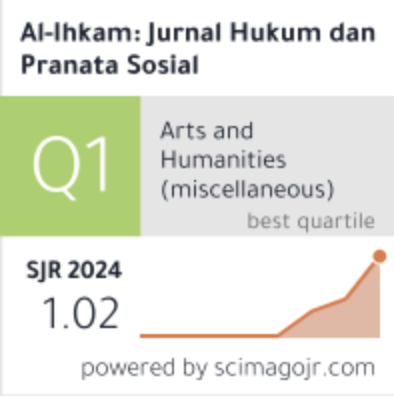KONSEP PEMBANGUNAN EKONOMI BERBASIS ISLAM (Sebuah Upaya Pembangunan Ekonomi Indonesia yang Adil, Makmur, dan Sejahtera)
 Abstract views: 961
,
Abstract views: 961
,
 PDF downloads: 3503
PDF downloads: 3503
Abstract
Abstract:
Islam anticipates economic developmen, however it still consider as a part of the development of human being as the greatest one. The essence is that human being enables to control the economic environment as well as to improve the life quality. There are four basic Islamic teachings dealing with the philosphy of Islamic economic development: tawhîd, rubûbiyah, khalîfah and tazkiyah. The principle of tauhîd is to prevent a concentrated economy power. khalîfah principle is to guard against environmet damage and to protect natural sources conservation. The principle of tazkiyah to prohibit social imbalance and to realize equality and justice. Accordingly, it can give shape to a continuity development. The concept of continuity development is essentially the implementation of the principle of rubûbiyah, it is the priciple of education, maintenance, and continuity to the perfectness, as the principle of divinity (ilahi). Hence, if the four principles are realized in the Indonesian economic development, government will easily create the nation’s ambition, a prosperous and justice nation.
Key Words:
ekonomi Islam, homo economicus, dan pembangunan ekonomi
Downloads
Download data is not yet available.
Published
2012-07-21
Issue
Section
Articles
In order to be accepted and published by Al-Ihkam: Jurnal Hukum dan Pranata Sosial, author(s) submitting the article manuscript should complete all the review stages. By submitting the manuscript, the author(s) agreed to the following terms:
- The copyright of received articles shall be assigned to Al-Ihkam: Jurnal Hukum dan Pranata Sosial as the publisher of the journal. The intended copyright includes the right to publish articles in various forms (including reprints). Al-Ihkam: Jurnal Hukum dan Pranata Sosial maintain the publishing rights to the published articles.
- Authors are permitted to disseminate published articles by sharing the link/DOI of the article at Al-Ihkam: Jurnal Hukum dan Pranata Sosial. Authors are allowed to use their articles for any legal purposes deemed necessary without written permission from Al-Ihkam: Jurnal Hukum dan Pranata Sosial with an acknowledgment of initial publication to this journal.
- Users/public use of this website will be licensed to CC-BY-SA.



.png)
_1.png)


_page-00011.jpg)








